This post may contain affiliate links. Please read our disclosure policy.
Not sure if your cosmetic products are safe? Here’s a quick and easy list of the top ingredients to avoid in skincare and makeup products.
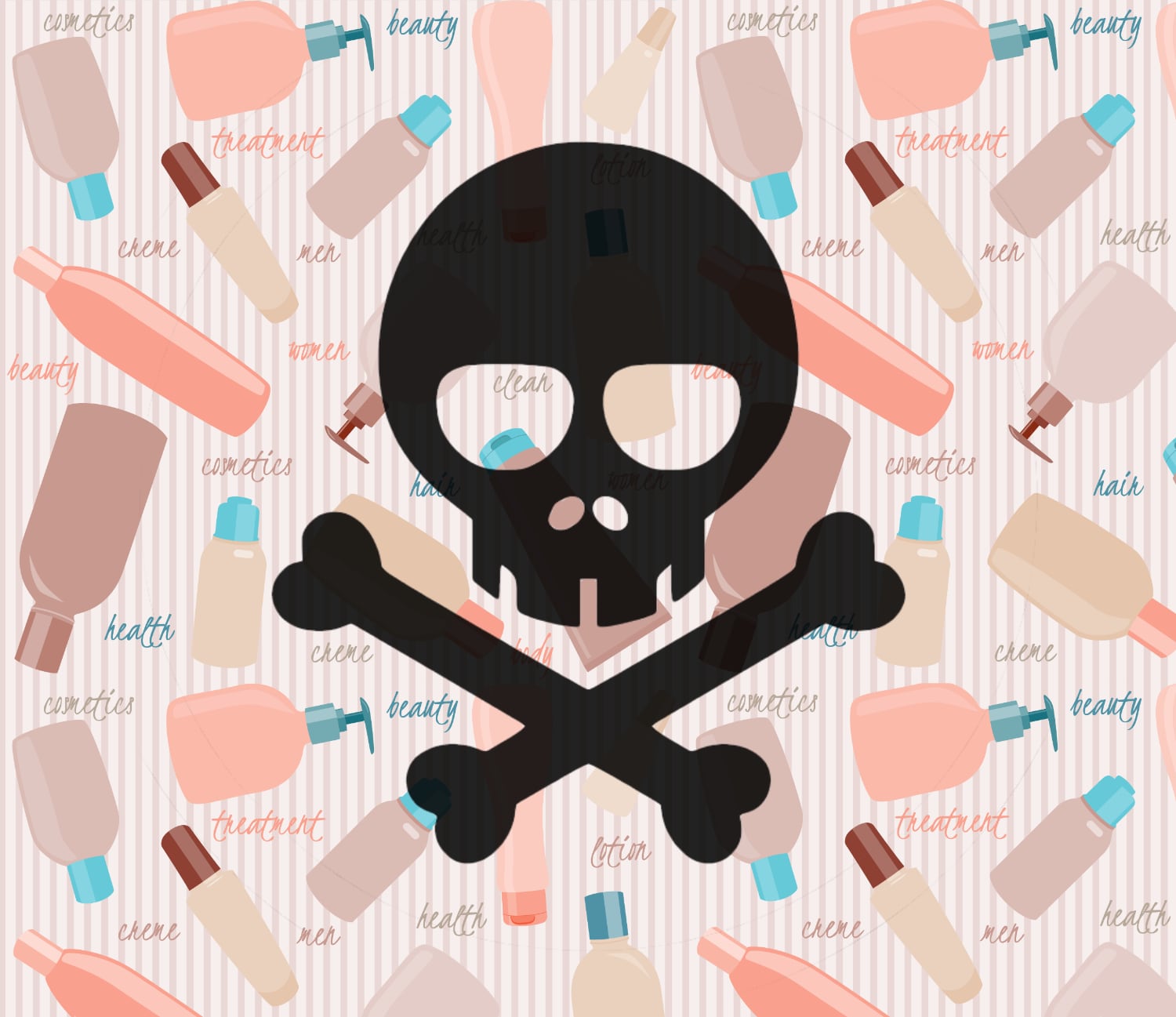
For the majority of my twenties, I thought health was really just about food and exercise. While both of those things are important, I had no idea that what I was putting on my skin on a daily basis was negatively impacting my health.
When I got pregnant with my first child at age 31, I suddenly cared a lot more about what potential dangers were lurking in my lipstick, and how harmful ingredients impacted pregnancy.
It turns out ignorance was bliss. I was shocked to learn the number of harmful ingredients in skincare products. And, I was even more surprised to find out there is little to no government regulation in the cosmetic industry.
According to a survey done by Environmental Working Group, the average woman uses 12 products containing 168 unique ingredients every single day. Some of these are know carcinogens and endocrine disruptors, which can inhibit your body’s ability to balance hormones.
After researching skincare ingredients to avoid and learning more about how it could impact my family’s health, I knew I needed to make the switch. The best way to proactively choose safer products is to know which ones to avoid. So, I’ve put together a comprehensive list you can read here and download!
PS: I now write a monthly newsletter centered around understanding harmful ingredients in skin care and cosmetic products. Join my Clean Beauty Community to get it!
Jump to:
Lack of Regulation with Skincare Products
Unfortunately, there is little to no federal regulation of the cosmetics industry in the United States. A product can go straight from manufacturing to store shelves without any type of approval or mandatory safety testing. The Food and Drug Administration only regulates misbranding or false advertising on packages—not what actually goes inside the packages.
More than 1,600 chemicals are banned for use in cosmetics in the European Union due to questions over their safety. In comparison, the U.S. has only banned 11.
But that’s not the only problem. If a product is sold in stores and consumers (like me and you) report problems—like a lotion caused a severe reaction—the company does not have to report the complaint to the FDA. And when the FDA is alerted of the complaint? The FDA has no authority to issue a recall of cosmetic products. Companies must self regulate.
Here are some examples of where this regulation hasn’t worked:
- In July 2018, Johnson & Johnson was ordered to pay a $4.96 billion settlement to 22 women who found asbestos in talc in baby powder caused their ovarian cancer.
- Guthy-Renker, the manufacturer of WEN hair products, settled a class-action lawsuit for $26 million after consumers said it caused rashes and hair loss.
- After decades of use in soaps, the FDA finally banned triclosan from soap in 2016 over concerns about its long-term safety and contribution to antibiotic-resistant bacteria. Unfortunately, it is still used in many products like toothpaste, mascara, and foundation.
And there are lots of other chemicals that are known to be dangerous, including the ingredients to avoid in skincare products listed below, but are still widely used in the cosmetics industry.
Are “Natural” Skin Care Products Better?
When it comes to skincare and cosmetic products, there is no regulation on the term “natural”. In fact, natural products can contain just as many chemicals as conventional ones. Even products labeled unscented can contain synthetic fragrances.
The only way to know for sure if there are harmful ingredients in a product is to read the label. But even then, not every ingredient has to be listed, as some formulations (like for fragrance) are considered trade secrets and don’t have to be disclosed.
And perhaps the biggest misconception in cosmetics, switching to natural makeup isn’t always better. In fact, many natural brands, including mineral cosmetics, can be some of the worst offenders. They often use a higher concentration of natural materials that can be contaminated with heavy metals such as arsenic and lead.
Do I Need to Avoid All Chemicals?
Certainly not! Chemicals are nothing to avoid or be feared. You are made of chemicals. Everything that you can taste, smell, or hold—including water, coconut oil, and even dirt —is made up of chemicals.
There is no such thing as chemical-free cosmetics, and “natural” cosmetics are not free of chemicals. What you want to avoid is harmful chemicals in cosmetics, that is, chemicals that have know negative health effects. Just because skincare or makeup ingredients are natural, doesn’t make them safe. And just because an ingredient is synthetic doesn’t mean it’s unsafe.
What Now?
Because there is little to no regulation of harmful ingredients in cosmetic products, it is up to you to choose safer products for yourself and your families. While they are few and far between, there are a number of companies that are paving the way for transparency, responsibility, and safety testing in makeup and skin care for women, men, and kids. Check out some of the Best Clean Beauty Brands if you want options.
10 Ingredients to Avoid in Skincare and Makeup Products
1. Parabens
Parabens are preservatives found in everything from soap to lotion to makeup. If it has water in it, it probably has parabens to keep it from growing bacteria. Examples include: methylparaben, proplyparaben, isopropylparaben, and isobutylparaben.
Parabens are known endocrine disruptors, meaning they mimic estrogen in the body and can cause hormonal issues. A recent study found concentrations of parabens, specifically methylparaben, in human breast tumors. Another study found 99% of all cancerous breast tumors contained parabens.
2. Artificial Fragrance/Parfum
Almost every single conventional skincare and cosmetic product (even “unscented” ones) contains artificial fragrances. Manufacturers aren’t required to reveal what’s actually in their fragrances, so you’ll simply see “Fragrance” or “Parfum” on the ingredients list when it could actually be a cocktail of carcinogens, allergens, endocrine disruptors, and irritants.
3. Sodium Lauryl Sulfate and Sodium Laureth Sulfate
SLS/SLES are foaming agents used in a slew of personal care products, including skin care and cosmetics, shampoo, and toothpaste. They are surfactants that can cause skin irritation or trigger allergies. Additionally, chemical compounds known as “nitrosamines” are common by-products of the sulphation process. 90% of nitrosamines are believed to be carcinogenic.
4. Toluene
Toluene is a chemical commonly found in nail polish and hair dyes. It is a volatile petrochemical solvent that can be toxic to the immune system and can cause birth defects. Because of this, be especially careful and avoid nail polish containing toluene entirely when you’re pregnant.
5. Phthalates
A phthalate is a plasticizer that is added to plastic to keep it from becoming brittle. Phthalates are used in cosmetics primarily in fragrances, and can also be found in other personal care products, such as hair spray and nail polish. Examples include: DBP, DEHP, DEP and others. Phthalates are endocrine disruptors and can cause hormonal and reproductive problems, and birth defects.
6. Polyethylene Glycol (PEG)
Polyethylene Glycol (PEG) is used is many types of cosmetics as a thickener, especially in lotions, shampoo, and sunscreen. PEG is often contaminated with both ethylene oxide, a known carcinogen, and 1,4-Dioxane, which causes respiratory problems and is banned in Canada.
7. Formaldehyde
Formaldehyde is a preservative included in many cosmetics products. It’s a known carcinogen that is linked to asthma, neurotoxicity, and developmental toxicity. It can be found in preservatives such as quaternium-15, DMDM hydantoin, and imidazolidinyl urea.
8. Oxybenzone (and other chemical sunscreens)
Sunscreens come in two different forms: chemical and mineral filters. The most common sunscreens on the market use chemical filters such as avobenzone, oxybenzone, octocrylene, and ecamsule.
In 2019, the FDA released research that showed widely used chemical UV filters are absorbed in the body in substantial amounts right after application. And in 2020, the FDA released new research that reveals six chemical UV filters are detectable on the skin and in the bloodstream weeks after application.
Blood tests showed concentrations of oxybenzone were more than 180 times the FDA’s level of concern after a single application, and soared to more than 500 times after 4 days of regular use.
This is highly problematic. These chemicals are known endocrine disruptors, meaning they can block or alter proper hormone function in the body. Oxybenzone, which is found in 40% of chemical sunscreens, is linked to hormone disruption, negative birth outcomes, and reduced male fertility.
Chemical sunscreens should be avoided—especially with children! Oxybenzone can also be found in sunscreen, SPF lotions, lip balm, and makeup, and tinted moisturizers. Stick with mineral-only sunscreens, which create a barrier on the surface of the skin to physically bounce or reflect the sun’s rays away from the skin. This is the mineral sunscreen I recommend.
9. Diethanolamine
Diethanolamine is a foaming agent. It’s been found to be a possible carcinogen and respiratory toxin, which is why the EU has restricted its use in personal care products. Despite this, it’s still used in bubble bath, body wash, and shampoo in the US. It’s often abbreviated as DEA on cosmetic labels.
10. Triclosan
Triclosan is an antibacterial agent once used in antibacterial soaps. In 2016, it was banned from soap used in health-care settings, but it is still allowed in personal cosmetics. Not only does triclosan contribute to antibiotic resistant bacteria, but it’s also been found to be endocrine disruptor and was shown to contribute to gut inflammation and promote tumor growth in mouse studies. Not good.
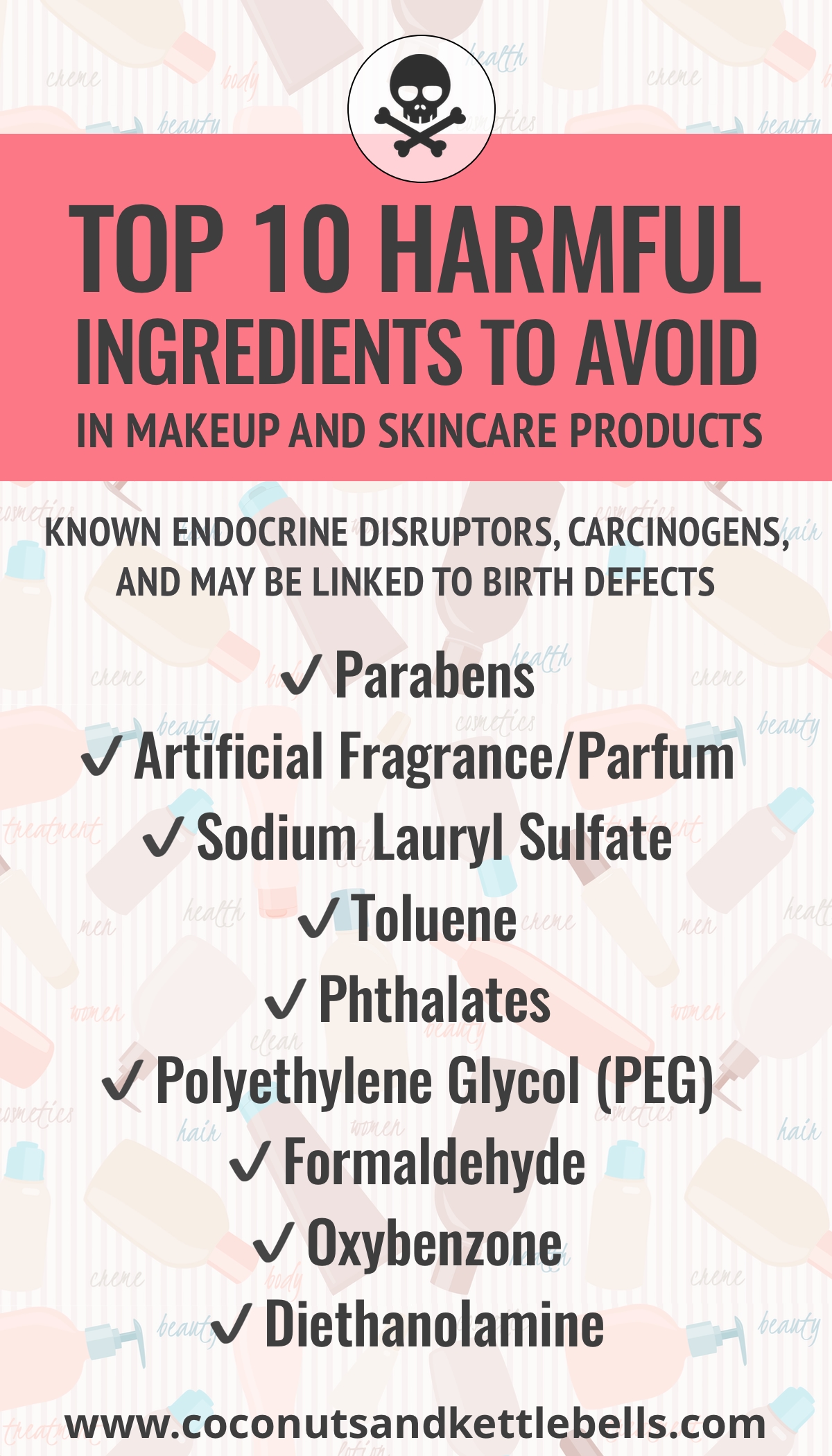
Avoiding Ingredients in Skincare Products
Besides reading labels, one of the best resources I have found to evaluate the safety of products is the Environmental Working Group’s Skin Deep Database. Each product is given a score based on the ingredients it contains. Because of this, it’s a super easy way to figure out if the products you are using on yourself and your children are safe.
If you’re looking for a good place to start, check out my Guide to Clean Beauty Brands for a comprehensive list of different clean beauty brands, and where they stand on ingredients and testing for heavy metals.
My goal in sharing this information is to empower you to make better decisions for yourself and your family. Hopefully, one day there will be better regulation in the cosmetics industry and all personal care products will be safer. Until then, check ingredients lists for these skincare ingredients to avoid, and start with the brands below!
My Favorite Safer Cosmetics Brands
1. Beautcounter
Beautycounter is what I use exclusively now for skin care and makeup. In particular, the Countermatch line does wonders for my dry skin, and I use the Countertime line for its anti-aging effects. It’s the only skin care brand I’ve found that actually works and my skin hasn’t felt dry and has been blemish-free since using it. (Many people with sensitive skin are actually sensitive to the harmful ingredients and contaminants!)
I’m a makeup junkie, and it’s the only makeup with a safer label that doesn’t make me breakout and has a beautiful pigment. They also do rigorous testing in their color cosmetics for heavy metals like lead.
2. Primally Pure
Primally Pure is a brand that makes natural skincare products with ingredients that are sourced with the utmost attention and care. If you’re looking for a natural deodorant that works—the Charcoal Deodorant is it! I also love the Everything Spray and use it nightly as a toner and throughout the day to freshen up my face (great for after a workout).
3. Dr. Bronner’s
Dr. Bronner’s is an organic soap brand that only uses pure organic and Fair Trade ingredients. There are no synthetic preservatives, and no detergents or foaming agents. They make the most magical Pure-Castile Liquid Soap that can be used for just about anything. I also use their All-One Toothpaste and Pure-Castile Soap Bars.
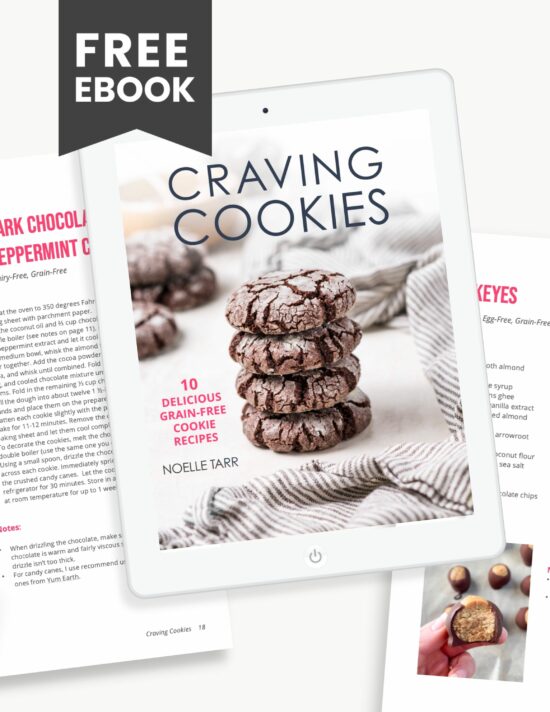
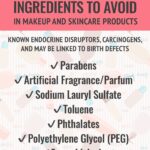
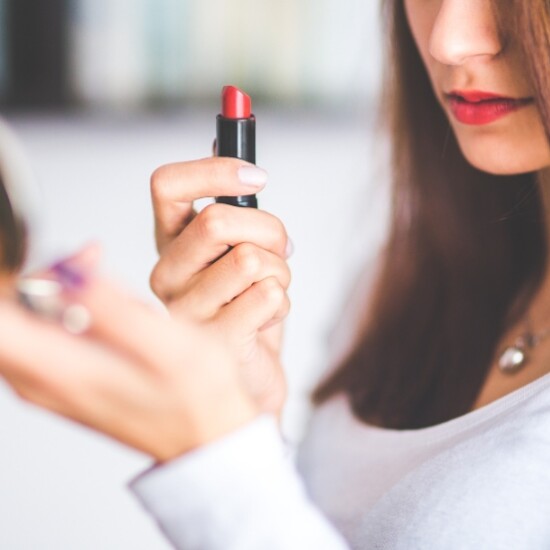
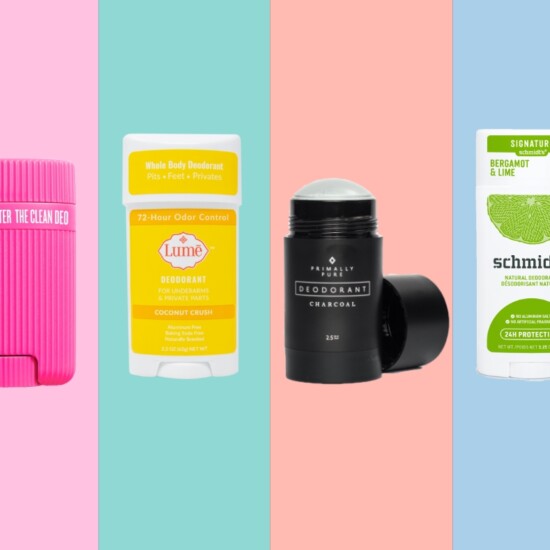
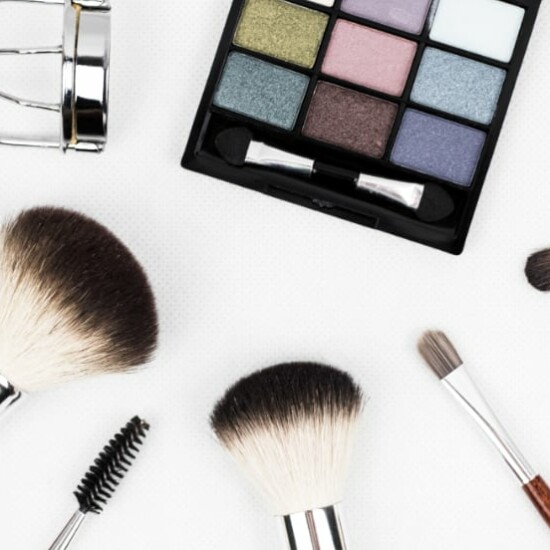
Sarah Romero says
Any opinion on Mrs. Meyers products? I LOVE their products and use them regularly, but not sure if they’re as “natural” as they claim. They do use “fragrance” but their explanation of it on their website is: “mixture of natural, high-quality essential oils and safe synthetic fragrance ingredients.” Would love your thoughts on their products in general. And thank you for this awesome post! This topic can be so overwhelming and confusing, and you’ve simplified it in the perfect way 🙂
Noelle says
Mrs. Meyer’s is definitely a safer option over conventional cleaners, but the synthetic Fragrance is unfortunately not completely safe (in my opinion, and the opinion of the EWG). And they do have other questionable ingredients in their products, including SLES. I personally use all Better Life products for my cleaning supplies (everything from the all-purpose cleaner to the hand soap to the dish detergent gel) and the performance is AWESOME. I use Molly Suds for my laundry detergent—I get the best price for this on Thrive Market. Hope that helps! Thanks for the love. 🙂
ashley morgan says
mrs. Meyers products STILL contain toxins in their products that the FDA arent required for them to list. check the ingredients all the way! they are not good. I use my shopping clubs products. they are 100% safe!
Terri says
What about Argonne products?
Marlene says
Hello,
I was wondering if you have investigated 100% Pure products.
Thank you,
Marlene
Noelle says
They are a great company with safer products! A lot of my colleagues used to use their products as they’ve been around for awhile. The quality and makeup performance isn’t always up to par (not as pigmented, blendable, or doesn’t have the best staying power), but overall a great choice if you find something that works for you.
Francis Hernandez says
Nice article. What about BHT? And what about the Soaps and creams of Organic Skin Japan? Thanks
Noelle says
BHT (both Butylatedhydroxy Anisole and Butylated Hydroxytoluene) are synthetic antioxidants used to extend shelf life. They are likely carcinogens and hormone disruptors and may cause liver damage. Found in: lipsticks, moisturizers, diaper creams, and other cosmetics. No idea about Organic Skin Japan. Use this list to evaluate the ingredients if you have those products in your home.
Sharon says
I bought Dr rashel beuty product ordered it from jumia but I can see it has parabens in it and fragrance but not written artifical just fragrance
From my point of view I don’t see it being safe for me 8
Stephanie says
Hi! I have been researching toxic free companies for a while now and even looked into beauty counter. I found that beauty counter uses phenoxythenal in some of their products. What is your opinion on the use of phenoxythenal in products?
Noelle says
Absolutely! The concerns over phenoxyethanol are largely from animal studies that involve ingesting (not transdermal application) at extremely high doses. What sparked most people’s concern was a case of an infant ingesting the chemical in a nipple cream. However, there are pretty big data gaps (meaning we just don’t know much about it), so Beautycounter commissioned a toxicological report on phenoxy in June 2013, did an update in 2014, and late last year commissioned new research on the chemical that will determine if there are any red flags re: hormone disruption since there are so many data gaps and that is a health issue we’re particularly concerned about.
To date, the research we’ve done personally has showed good news: One cell receptor proliferation assay on phenoxyethanol showed no estrogenic activity or antiestrogenic activity.
Translation: there is more work to do, but preliminary data indicates it isn’t setting off any alarms re: estrogen receptors, which is great.
What’s interesting/crazy is that in the beauty industry, anytime less than 1% of an ingredient is used, it IS NOT required by law to be disclosed on the ingredient list to consumers. But since transparency is a huge value of Beautycounter’s we disclose 100% of our ingredients regardless of the % used. This may throw some consumers off because they probably aren’t used to seeing some of these ingredients on labels and yet it’s possible they are hiding in their products.
Regardless, what’s included in our products is such a low %—it is absolutely nowhere compatible with the animal studies or ingestion as with the case with the infant.
Beautycounter does have a number of skincare products free of preservatives including the Countermatch collection (aside from the cleansing milk) and face oils. Let me know what you are comfortable with or prefer and I’m happy to make recommendations suited for you.
Vickylynn Scott says
What about life clean products
Noelle Tarr, NTP, CPT says
I don’t know anything about life clean products? Can’t even find it in a google search. Check the ingredients on your products using this list.
Karen says
Hello Noelle, I am 55 and just now starting to be concerned with ingredients I am putting on or in my body. What do you know about TruSkin products. The seem to be natural and plant based. How do they compare to Beautycounter?
Noelle says
Just a quick glance at the ingredients and unfortunately there are quite a few known harmful ingredients in the products, so I can’t recommend them. I have no experience with them personally so I can’t speak to performance.
farah says
hi.. what about paula’s choice products? i’ve been suffering from acne and scars since about 7 years.. and i’m afraid to try nowadays skincare since some of them might be harmful and some of them a bit expensive for me..
Noelle says
I would recommend checking them out on the EWG Skin Deep database. The ingredients will vary based on the product, and you’ll be able to look at individual ratings.
Sunnie says
phenoexenethanol was similar to a paraben in by the way it allows other damaging ingredients to penetrate the skin. Is that incorrect?
Noelle says
What studies are you referring to?
Tabitha Wyckoff says
Thank you for this information. Now I can explain to my family why I don’t use certain products. My question is how accurate is the think dirty app? It’s were you can scan products and they tell you the rating on how clean or dirty the product is.
Noelle Tarr, NTP, CPT says
I personally prefer the EWG Skin Deep database. Think Dirty does not allow for an apples-to-apples comparison of products or brands, or an accurate view of the real-life use of cosmetics chemicals. Some of the ingredients in Think Dirty score high because of one or more studies indicating that they may be allergens. While individuals with allergies may have reactions to certain ingredients, that doesn’t mean those ingredients present hazards to the general population. Other ingredients score high because they may contain impurities. But, companies can obtain certificates of purity from suppliers to ensure that ingredients are not contaminated. And, companies like Beautycounter test raw materials and end products for contaminants. So, just because an ingredient CAN be contaminated doesn’t mean it’s unsafe to use. Because of this, products tend to get ranked as “high hazard” when they’re technically not.
Nathalie Cabrera says
Loved this article !
I recently found the Honest Company , and they claim to use natural ingredients and test all their products. Would you happen to know anything ?
Noelle says
I recommend checking the products out on the EWG Skin Deep database.
Suzanne brooks says
Have you heard of the Eldivia company? Any comments?
Noelle Tarr, NTP, CPT says
I have! It does seem like they are a safer brand (as per their FAQ and the ingredients they do not include) but I don’t have any personal experience with the effectiveness of the products.
shani says
hi what about brands like sweet pea organics, andalou , or natures gate ?
Noelle Tarr, NTP, CPT says
I would recommend checking them out on Environmental Working Group’s website. If certain products are not listed, check the ingredients label for items in the list above. You can also reach out to individual manufacturers to ask them how they test for contaminants.
Linann Pearson says
How about the Jennifer Bradley medical grade brand of makeup and skincare?
Noelle Tarr, NTP, CPT says
Unfortunately I don’t know. They don’t have any information on their website about sourcing, or testing of raw materials and end products for contaminates, so I’m guessing they don’t do any additional safety testing beyond the basic regulation of the 11 substances in the US. Also, they don’t disclose ingredients, which is a problem. I would stick with what I’ve recommended above.
Kristy says
Thanks for all the great info. What are your thoughts on the Monat line of skincare?
Noelle Tarr, NTP, CPT says
Definitely a safer option, but from what I can tell there are still some questionable ingredients, and they aren’t as transparent with sources and testing. I do not think they test raw materials and end products for contaminants.
Sher says
Hi,
What are your thoughts on Weleda skin food and Malin and Goetz deodorant ?
Noelle Tarr, NTP, CPT says
Have you tried checking it through the EWG.org Skin Deep database and looking at the ingredients for the ones on this list?
Carrie says
Hi, thank you for this article! I have been using EWG and Think Dirty app and having doing a mass clean out of household, beauty and other care items. What is your opinion of Think Dirty? Is it accurate? I am finding that some products on EWG are rated 3 while Think Dirty has them an 8 thus prompting me to trash everything!
Noelle Tarr, NTP, CPT says
Hi Carrie! This is actually a common issue! While both are good—I don’t typically recommend Think Dirty because they tend to rank certain products as hazardous simply because they contain potential allergens. While certain people may be allergic to a certain ingredients, that doesn’t mean a product is hazardous, especially if someone isn’t allergic to that specific ingredient. Other products are ranked high because of the potential for contaminants, however, some companies have certificates of purity, or test raw materials and end products for contaminants (like Beautycounter). Stick with EWG!
Jeradawn says
Hi! I’m looking to switch to a brand called Maskcara Beauty. I’m unable to find them on either verifying sites. Likely because it’s smaller and somewhat new I think. In looking a the foundation aka highlights it doesn’t list any of your top 10 ingredients to avoid. But I’m not sure if the rest of the ingredients are safe or safer or items 11-15 on the items to avoid. Haha. Below is the one item I reviewed under FAQs on their sight.
Linen
Liquid Paraffin, Petrolatum, Ozokerite Wax, Beeswax, Cetyl Esters, Lanolin, Zinc Stearate, Phenoxyethanol, Iron Oxides, Titanium Dioxide, Ultramarines
Thank you for your article and input on this line.
Noelle Tarr, NTP, CPT says
Hi there! So, I did look into the brand for you. I don’t see anything about their stance on avoiding harmful ingredients on their website, so I’m not sure if that’s part of their mission or not. As far as ingredients on the list, for the couple ones that I looked at, I do see they use fragrance. Also, I don’t know if they do any additional testing for contaminants.
Tarra says
Triclosan also is responsible for developing an ovarian cancer. Parabens accelerate by the sun can cause melanoma. If you want more information about this topic, check Do I Have Cancer by Berry Khatri, very nice guidline into cancer types and factors.
elena says
hello, what about lotus moon skin care, they seem to use no chemicals in their products
Noelle Tarr, NTP, CPT says
Hi there! So, everything is a chemical, even water! The goal is to find safe products free of harmful ingredients that perform well and utilize ingredients that have proven effects. Testing ingredients for contaminants is also important, especially with natural brands. In general, I would be cautious with any brands that use buzzwords like “chemical-free” or “non-toxic” as these aren’t regulated and don’t mean anything. That being said, it does look like Lotus Moon uses natural ingredients. I’m not sure about the performance of the products as I have no experience with them personally, and I don’t know about their testing processes. You can always search brands on the EWG Skin Deep database, and check the ingredients list against the list above!
Shalin says
Hi
I am from India and none of these brands listed above I get here
Can you help me with a brightening cream which I can use and a vitamin c serum
Noelle Tarr, NTP, CPT says
I am sorry—I don’t have any personal experience with any brands in India. Are you able to look at the ingredients on products using the list above?
Ceara says
Hi, I have been using Sukin products for a while now
Do you know much about this product? It claims to be almost “free” of everything harmful – is this true?
Thanks
Noelle Tarr, NTP, CPT says
Hey Ceara! Doing a quick look over, it does look like they give good attention to ingredients, which is great! I don’t know about heavy metal testing, and I wasn’t able to look at all products. Definitely use the list above to look at individual products you are using, and check EWG for more info!
Jessa says
hi what can you say about cover fx? Thanks !
Noelle Tarr, NTP, CPT says
Check the EWG skin deep database for information on individual products. CoverFX is on there (see here: https://www.ewg.org/skindeep/search?utf8=%E2%9C%93&search=cover+fx). Most items look relatively safe! I don’t have any personal experience on how well it performs because I haven’t used it personally.
Lara says
Are the brands that you talked about up Cruelty Free?
Noelle Tarr, NTP, CPT says
Yes! Beautycounter is Leaping Bunny certified.
Heba Youssef says
Thanks for the article its very beneficial.
Do u hear anything on OZNatural? I have tried EWG but with no luck. TIA
Noelle Tarr, NTP, CPT says
Hi there! I did just a quick look into this brand. Initially, I thought their products would only contain natural ingredients, as they use the word “natural” heavily throughout their website and marketing. Unfortunately, this is likely misleading for consuming because their products are not at all natural. Synthetic ingredients aren’t bad, FYI, but the term “natural” is completely misleading and not applicable to their brand. I also took a quick peek at the ingredients list on one item, and found one harmful ingredient, Polysorbate 20. I stopped there. Hope that helps!
nancy says
have you heard of Farmasi from Turkey
Noelle Tarr, NTP, CPT says
I have not, I’m sorry.
Ines says
Hat have you heard about Farmasi? Supposedly it launch this year, some said they are great products, affordable. But still like to know your thoughts!!
Noelle Tarr, NTP, CPT says
I haven’t! So sorry.
Kerri Mitchell says
I just came across the brand VapourBeauty. It’s the first seemingly natural make up brand that hasn’t clogged my pores and lasted for longer than two hours. These are the Ingredients:
Prunus Amygdalus Dulcis (Sweet Almond) Oil*, Simmondsia Chinensis (Jojoba) Seed Oil*, Macadamia Integrifolia (Macadamia) Seed Oil*, Undecane†, Dicaprylyl Ether†, Dicaprylyl Carbonate, Mica‡, Tridecane†, Silica‡, Kaolin‡, Alcohol*, Hydrogenated Castor Oil†, Balanites Roxburghii (Desert Date) Seed Oil*, Aluminum Hydroxide‡, Tocopherol (Vitamin E)†, Sodium Lauroyl Glutamate†, Citrus Limon (Lemon) Peel Oil†, Lysine†, Magnesium Chloride‡, Helianthus Annuus (Sunflower) Seed Oil†, Citral†, Limonene†; May Contain +/-: CI 77891/Titanium Dioxide; CI 77491, CI 77492, CI 77499/Iron Oxides
* Organic
† Plant derived
‡ Mineral derived
Have you heard of them?? I also tried their Essential Daily Primer which seems to make the make up “stick” well.
I loved your article. Thank you so much!!
Noelle Tarr, NTP, CPT says
Thank you! Glad to help. Good news—that brand is on the EWG Skin Deep Database! Check it out to see the safety of all of their products.
Christine says
Have you heard of Suzanne Organics, and if so, what are your thoughts?
Thank you!
Noelle Tarr, NTP, CPT says
Definitely looks like a safer line! I can’t find anything about their testing for contaminants like heavy metals. And I can’t speak to whether it actually works/performs.
Christine says
I’ve been using her products for about a year and I’m very happy with them. Thank you for your response!
Christy Brozak says
Have you done any research on Jennifer Bradley Skincare products? The company heavily advertises on FaceBook as natural and safe and wondering if this is true.
Time Freeze
4 in 1 Foundation
DNR Creme
Oxygen Mask
Cooling Serum
Noelle Tarr, NTP, CPT says
Hi Christy. I tried to do some research and came up with nothing. They aren’t EWG certified or even on the Skin Deep database. I couldn’t find any information about their ingredients, and from what I can tell, they don’t do any additional testing to make sure there aren’t heavy metals/contaminants. I can’t personally recommend them.
Jennifer Huffman Smith says
Is Beeswax a bad substance? Like Burt’s Bee’s? Can’t find info.
Noelle Tarr, NTP, CPT says
Beeswax is a safe ingredient.
Silje says
Hello!
Do you have any thoughts about Citric Acid? Should I avoid all ingredients witn “sodium” in it?
Noelle Tarr, NTP, CPT says
You can search any one individual ingredient on the EWG database! Here’s the details on citric acid. It’s a safe ingredient.
Diane Yutzy says
Do you know anything about Tula? I am looking for a good clean primer that helps your makeup last & also helps with fine lines.
Noelle Tarr, NTP, CPT says
I don’t recommend Tula Skincare. Despite saying they’re clean skincare, they have known harmful ingredients I’ve included on this list, including “Frangrance” in their products.
AM says
I just put all these harmful ingredients into incidecoder, a database of hundreds of thousands of products, and not a single one came up as having none of these soooo I guess pick your poison? If you had to pick one category to slide by on, could you pick one? Just curious which would be the “least” detrimental. I think this is why percentages of ingredients in products should be published, if only the bad ones. Just a thought.
Noelle Tarr, NTP, CPT says
I know plenty of brands that contain absolutely NONE of these (linked above to the three I use!). My personal favorites are Beautycounter and Primally Pure. Also check EWG database as recommended in the post.
Nkwelle Quinta says
I’m using Longrich rejuvenating Body Lotion. I just read your article and to my greatest surprise these are ingredients they used:
-Aqua.
-Potassium lauryl phosphate
-Glycerin.
-Mineral oil
-Glyceryl stearate
-Cetearyl alcohol
-Dimethicone
-Isopropyl palmitate
-Hydrolyzed collagen
-Hydrolyzed soy protein
-Coix lacryma-jobi ma-yuen extract
-Avena sativa(oat) kernel extract
-Bht
-Diazolidinyl urea
-Pentylene glycol
-Butylene glycol
-Carbomer
-Phenoxyethanol
-Methylparaben
-Methylparaben
-Ethylhexylglycerin
-Propylene glycol
-Sodium hydroxide
-Parfum
– 2-bromo-2-nitropropane-1
– 3-diol
These are all its ingredients, what should I do?
Noelle Tarr, NTP, CPT says
Switch to one of the safer options suggested above!
Lila says
I use farmstay peoducts. You think they are safe? especially some I know used their products and formed some acne and other did not and worked very well with them. W
Noelle Tarr, NTP, CPT says
No. If you look at the ingredients list for individual products and compare it to the items in the post above, you’ll see their products contain a lot of known harmful ingredients.
Delores Byam says
Hi Noelle I thank God I found your article that enlightened me more, and is checking everything for harmful ingredients. My blood mercury level kept rising and the DOH told me to avoid certain sea food which I did not eat for decades. The safe measurement is < 5 but mine is over 65. My body kept getting disrupted but tests do not show why. My creams, soaps and make up are loaded with poisonous stuff. Thank you for being so candid and to the point when presenting information, and so gracious to suggest safe products. thank you.
Maureen Flowers says
Hello there,
I was wondering what your opinion is regarding the Eminence skin care line?
Noelle Tarr, NTP, CPT says
I don’t have any personal experience with them. I recommend checking out my Buyer’s Guide to Clean Beauty Brands: Where to Start and What to Avoid. All of my research about a variety of brands is there! 🙂
David Silva says
As per my knowledge, Ethylhexylglycerin is a perfect replacement for Parabens.
Charisma says
How do you find out if a company uses all-natural fragrance in their products? I use a Pacifica face wash and on the ingredient list it has Parfum (natural) but does that mean that the fragrance blend is completely natural and safe?
Noelle Tarr, NTP, CPT says
Unfortunately, it doesn’t. You have to reach out to companies personally to figure this out. I’ve done this for about 50 different clean skin care brands. Check out my Buyer’s Guide to Clean Beauty Brands.
dania says
What about the ordinary?
Louis chilton says
Thanks a lot for this amazing information. Those harmful ingredients are not reallly safe. Thanks alot
Heather Stapleton says
Hi there! Have you researched Lemongrass Spa? We are 100% fragrance free, gluten free and cruelty free. I would love to send you some things to try. My cousin found out she had breast cancer when she was pregnant and passed away when her daughter was two. I am very passionate about sharing natural alternatives ❤️ Looking forward to hearing from you.
Heather Stapleton
Kelley Smith says
Hi Noelle. Thank you so much for educating us about harmful toxins in our skin care products. My daughter is high ranking within Rodan and Fields Skincare out of San Francisco. I keep telling her that the products are very toxic but of course she will have nothing to do with her Mother’s “knowledge”. I am currently developing organic plant based skin care products, medicines, and edibles and I find the information on your website to be very helpful. I will be sending folks your way, I assure you…Thanks for doing what you do!
Noelle Tarr, NTP, CPT says
Thanks Kelley! So appreciate your support. Good luck!
Alisha says
Hi!!
I was wondering if you have investigated the brand Epionce. They seem like they are paraben free and “natural” … but wanted to see if you had any input.
Thanks!! 🙂
Noelle Tarr, NTP, CPT says
Hey Alisha! I haven’t looked into this one personally, but I did write up a big blog post reviewing a large number of skin care brands. Check out Buyer’s Guide to Clean Beauty Brands: Where to Start and What to Avoid.
Bianca says
Hi,
Thanks for your article. Very nice.
I have a very sensitive skin and have tried many different products. Nothing really suited my skin until I found Meaningful Beauty from Cindy Crawford. This is so far the only product my skin seems to accept. Can you tell me what you think of their products?
I use their skin softening cleanser, creme de serum and the intensive triple exfoliating treatment.
I can’t find these items on the EWG.
Noelle Tarr, NTP, CPT says
Hey Bianca! They probably aren’t on EWG because they personally haven’t submitted their products to them, and therefore aren’t really trying to meet EWG standards. For my thoughts on other brands, check out Buyer’s Guide to Clean Beauty Brands: Where to Start and What to Avoid.
Gamble says
Remarkable! Its actually awesome paragraph, I have got much
clear idea regarding from this article.
Sarah Kay Schindel says
Hi Noelle,
What are your top clean brands for kids? Specifically body soap, shampoo, conditioner, de-tangle spray, laundry soap?
thank you!
Noelle Tarr, NTP, CPT says
Hey Sarah! I use California Baby, Earth Mama Naturals, and for laundry Molly Suds!
Nicole says
Hello! I was wondering if Clarins was also a brand that has safe ingredients or not.
Noelle Tarr, NTP, CPT says
Hey Nicole! I haven’t checked on that personally yet, but I would start with my post Best Clean Beauty Brands: Where to Start and What to Avoid. Hope that helps! 🙂
Carolina says
Hello! I was wondering if you were familiar with True Botanicals? I’ve been interested in their products but I want to make sure they’re safe. Thank you!
Noelle Tarr, NTP, CPT says
I haven’t looked into them yet, but I have reviewed about 30+ other safer brands here: Best Clean Beauty Brands: Where to Start and What to Avoid
Kîñgslēy McKenzie says
Hi Noelle , I’m Kingsley ,
So am wondering, what kind of cream should I use on my face , I have a long time pimples, that I can’t rid of , I’ve been trying different types of cream but no changes .
I really need help.!
If you want I can send you my photo.!
Noelle Tarr, NTP, CPT says
Hey Kingsley! Are these dry pimples, or acne? Is your skin more dry or more oily?
Mandi says
I too am VERY ingredients cautious. I use Top Layer Skin Care, I would highly recommend checking it out. I have studied beauty counter, and they are a super clean product which I love, but in my experience as a skin care therapist I have found it does not have enough powerful ingredients to cause change in skin conditions. Id like to invite you to look into it! Its clean and works on a microencapsulation technology which allows a slow release of ingredients allowing for retraining in the skin. The use of medical ingredients is very beneficial to causing change in skin conditions!!
I absolutely love this article!! We think the same and it makes me so happy to see people appreciating your knowledge!
Cassie Phillips says
Do you know if honest beauty is ok to use xx
Noelle Tarr, NTP, CPT says
Check out Best Clean Beauty Brands: Where to Start and What to Avoid. I have it listed there!
Samantha Felts says
Is CeraVe a good skincare line that have all good products or pick few products even?
Tayo says
Is it safer to use products from Europe since the EU is better at regulating the cosmetics industry. I use Oriflame from Sweden. I wonder if their products pass the test.
Noelle Tarr, NTP, CPT says
Not necessarily, no. You can find products that are safe (if not safer) in the US. For example, Beautycounter doesn’t allow any of the ingredients that are banned in the EU in their products, and some. They also test for heavy metals. Check out Best Clean Beauty Brands: Where to Start and What to Avoid for more info.
William L Todd says
been using jafra brand makeup for years.do you know any problems with the ingrediants??
Jas says
Very excellent article. I loved the information you have put in.
Gina Nyamunga says
Thanks. Great information. Appreciate your research. Benefiting from it.
Lee Berrios says
Thank you for this information. I have been searching for clean skincare and makeup. It is very time-consuming and frustrating.
Noelle Tarr, NTP, CPT says
I get it. Happy to help!
Soicau says
Thank you. I’m having a hard time choosing a product that’s right for me.
Noelle Tarr, NTP, CPT says
I would start with any of the recommendations above!
Olivia Emma says
Greatly appreciated, very well described and great in detail. Thank you for such a great effort. I got a clear idea about this subject.
Scott Johnson says
Hi Noelle, thanks for the info. Have you ever researched products from Melaleuca?